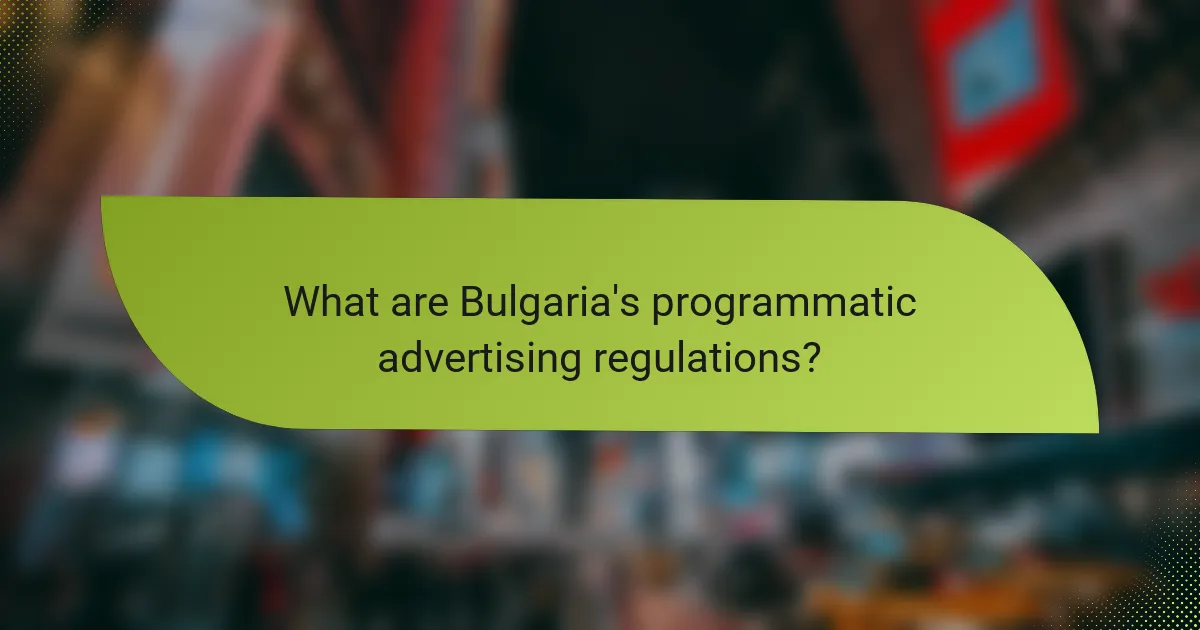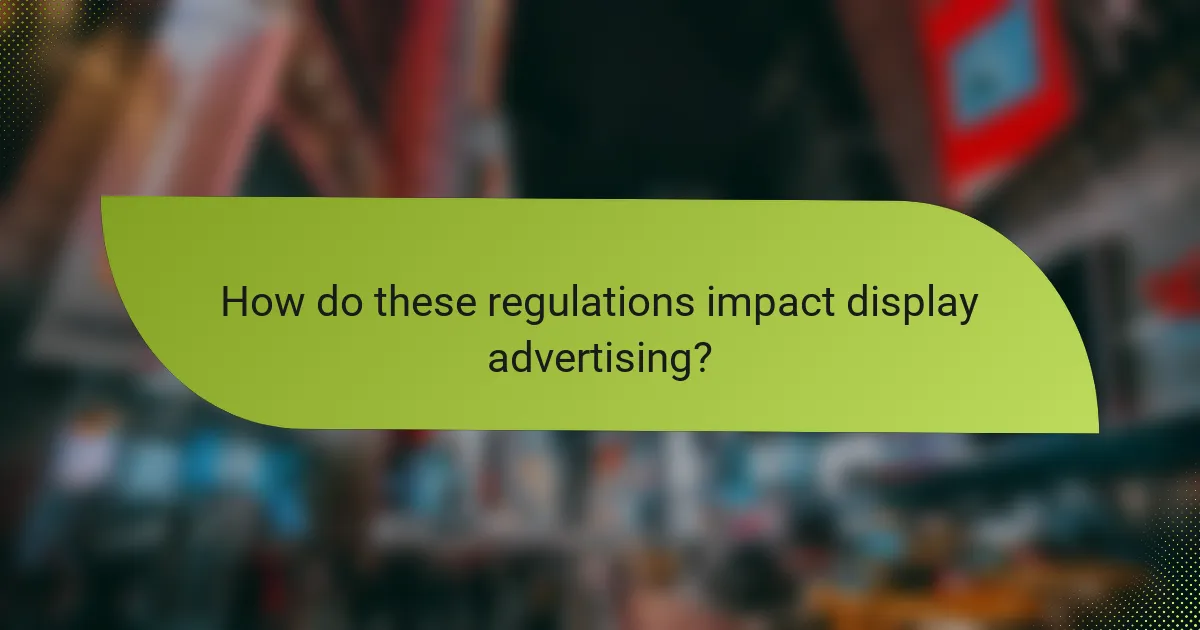Bulgaria’s programmatic advertising regulations are designed to promote transparency, protect consumer rights, and ensure data privacy in digital advertising. These rules dictate how advertisers can collect and utilize data for display campaigns, requiring adherence to both national laws and EU directives. By understanding and complying with these regulations, advertisers can enhance their campaign effectiveness while avoiding potential legal pitfalls.

What are Bulgaria’s programmatic advertising regulations?
Bulgaria’s programmatic advertising regulations focus on ensuring transparency, data protection, and consumer rights in digital advertising. These rules govern how advertisers can collect and use data for display campaigns, emphasizing compliance with both national laws and EU directives.
Overview of regulations
The regulations in Bulgaria require advertisers to obtain explicit consent from users before collecting personal data for programmatic advertising. This includes clear information on how data will be used, stored, and shared. Advertisers must also provide users with options to opt-out of data collection.
Additionally, there are stipulations regarding the transparency of ad placements and the use of automated systems. Advertisers must disclose the identity of the advertisers and the nature of the advertisements to ensure that consumers are aware of what they are engaging with.
Key governing bodies
The primary governing body for programmatic advertising regulations in Bulgaria is the Commission for Personal Data Protection (CPDP). This agency oversees compliance with data protection laws and ensures that advertisers adhere to the established guidelines.
Another important entity is the Bulgarian National Council for Self-Regulation, which promotes ethical standards in advertising. This council works to ensure that advertising practices, including programmatic methods, align with both national and EU regulations.

How do these regulations impact display advertising?
Bulgaria’s programmatic advertising regulations significantly influence how display campaigns are executed. These rules ensure that advertisers comply with data protection laws and maintain transparency in their advertising practices.
Compliance requirements
Advertisers must adhere to specific compliance requirements when running display campaigns in Bulgaria. Key obligations include obtaining explicit consent from users for data collection and ensuring that all advertisements are clearly identifiable as promotional content. Additionally, advertisers should maintain accurate records of consent and data usage.
It is essential to implement robust privacy policies that align with the General Data Protection Regulation (GDPR). This includes providing users with easy access to their data rights and options to opt-out of targeted advertising.
Potential penalties for violations
Violating Bulgaria’s programmatic advertising regulations can lead to significant penalties. Fines for non-compliance can range from a few thousand BGN to substantial amounts depending on the severity of the violation. Repeat offenders may face even harsher consequences, including increased fines and restrictions on their advertising activities.
In addition to financial penalties, companies may suffer reputational damage, which can impact customer trust and brand loyalty. It is crucial for advertisers to regularly review their compliance practices to mitigate risks associated with potential violations.

What are the best practices for compliance in Bulgaria?
To ensure compliance with programmatic advertising regulations in Bulgaria, advertisers should focus on adhering to local laws regarding ad content and data protection. Understanding these guidelines will help avoid legal issues and enhance campaign effectiveness.
Ad content guidelines
In Bulgaria, ad content must be truthful, not misleading, and should respect the dignity of individuals. Advertisers should avoid using offensive language or imagery and ensure that their messages do not promote harmful products or behaviors.
Additionally, all advertisements must clearly identify the advertiser and provide necessary disclosures. For instance, if an ad includes promotional offers, the terms should be clearly stated to prevent consumer deception.
Data protection measures
Data protection is critical in Bulgaria, governed by the General Data Protection Regulation (GDPR). Advertisers must obtain explicit consent from users before collecting or processing their personal data, ensuring transparency about how this data will be used.
Implementing robust security measures to protect user data is essential. This includes using encryption and secure storage solutions, as well as regularly reviewing data handling practices to comply with local regulations.

What tools can help with compliance?
To ensure compliance with Bulgaria’s programmatic advertising regulations, businesses can utilize various tools designed for this purpose. These tools help manage and monitor advertising campaigns, ensuring they adhere to legal standards and best practices.
Programmatic advertising platforms
Programmatic advertising platforms automate the buying and selling of ad space, making it easier to comply with regulations. Popular platforms like Google Ads and The Trade Desk offer features that help track compliance metrics and provide transparency in ad placements.
When selecting a platform, consider its ability to integrate with local regulations and reporting requirements. Look for features that allow for real-time monitoring and adjustments to campaigns based on compliance needs.
Compliance management software
Compliance management software is essential for tracking and managing regulatory requirements across advertising campaigns. Tools such as ComplyAdvantage and TrustArc can help businesses identify risks and ensure adherence to Bulgaria’s advertising laws.
These software solutions often include features like automated reporting, risk assessment, and policy management. Implementing such tools can significantly reduce the risk of non-compliance and streamline the process of maintaining regulatory standards.

How to navigate the regulatory landscape in Bulgaria?
Navigating the regulatory landscape for programmatic advertising in Bulgaria involves understanding local laws and engaging with relevant authorities. Compliance with these regulations is crucial for successful display campaigns and can help avoid legal pitfalls.
Engaging with local authorities
To effectively engage with local authorities in Bulgaria, familiarize yourself with the key regulatory bodies overseeing advertising practices. The Commission for Protection of Competition and the Bulgarian Data Protection Commission are essential contacts for ensuring compliance with advertising and data protection laws.
Establishing a proactive relationship with these authorities can facilitate smoother approval processes for your campaigns. Regularly attending industry workshops or seminars hosted by these bodies can also provide valuable insights into current regulations and best practices.
Legal consultation services
Utilizing legal consultation services is a strategic move for navigating Bulgaria’s advertising regulations. Experienced legal advisors can help interpret complex laws and provide tailored guidance for your specific advertising strategies.
Consider engaging a legal expert who specializes in advertising law and has a strong understanding of Bulgarian regulations. This can help you avoid common pitfalls, such as non-compliance with consumer protection laws or data privacy regulations, ultimately saving you time and resources in the long run.

What are the emerging trends in programmatic advertising regulations?
Emerging trends in programmatic advertising regulations focus on enhancing transparency, data privacy, and consumer protection. As digital advertising evolves, regulatory bodies are increasingly implementing measures to ensure that advertisers comply with ethical standards and protect user data.
Impact of EU regulations
The European Union has established strict regulations that significantly impact programmatic advertising, particularly through the General Data Protection Regulation (GDPR). These regulations require advertisers to obtain explicit consent from users before collecting and processing their personal data, which affects targeting strategies and data usage.
Additionally, the EU’s Digital Services Act aims to create safer online spaces by holding platforms accountable for harmful content and ensuring transparency in advertising practices. Advertisers must adapt their campaigns to comply with these evolving standards, which may include more robust data management practices and clearer communication with consumers.
Future of data privacy laws
The future of data privacy laws is likely to see increased scrutiny and stricter enforcement, driven by growing public concern over data security. Countries outside the EU are also considering similar regulations, which may lead to a more unified global approach to data privacy in advertising.
Advertisers should prepare for potential changes by implementing privacy-first strategies, such as minimizing data collection and enhancing user control over personal information. Staying informed about upcoming regulations and adopting best practices will be crucial for maintaining compliance and building consumer trust in programmatic advertising.



